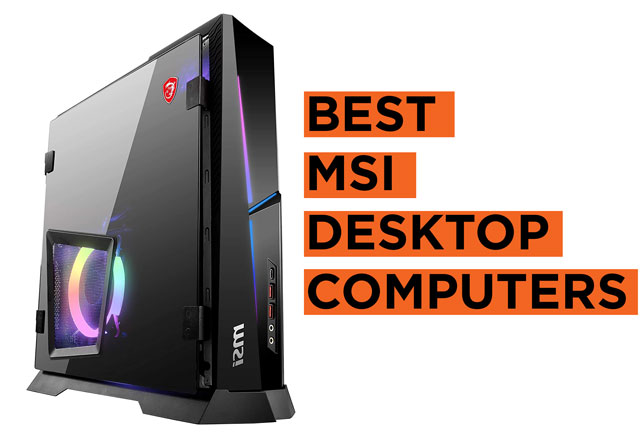If you are in the market for a Microsoft Surface desktop computer, you are probably aiming for a balance of design, performance, and reliability.
This guide is written for creative professionals, business users, content creators, and tech enthusiasts who value powerful performance in a premium, space-efficient form factor. We walk alongside you in this decision, giving you both the technical context and the practical advice to make an informed choice. By the end, you will have a clear understanding of what to look for and why it matters, so you can select a Surface desktop that fully meets your needs.
The right desktop can be the difference between smooth productivity and constant frustration. Many users feel overwhelmed by the sheer variety of specifications and features. There is also the challenge of aligning those features with specific workflows, whether you are editing high-resolution videos, running CAD software, or managing large datasets. We know that the wrong choice can limit your capabilities, waste your investment, and leave you upgrading sooner than you expected.
Common obstacles include uncertainty about processor capabilities, confusion over GPU requirements, doubts about RAM size, and questions about storage type. Even the display quality can be a make-or-break factor, particularly if your work depends on precise visuals. Add to this the importance of ergonomics and connectivity, and the selection process can feel daunting.
Here is where we introduce the solution. Microsoft Surface desktops, particularly the Surface Studio and Surface Laptop Studio (when docked for desktop use), offer a combination of engineering precision, visual excellence, and adaptable configurations that address these challenges. The key lies in knowing the essential specifications and the performance factors that ensure your investment delivers on every front.
We assess each Surface desktop against several crucial criteria. First, processor performance. A modern multi-core Intel Core i7 or i9 delivers rapid rendering, smooth multitasking, and faster execution of demanding applications. This mitigates slowdowns when running resource-intensive creative or analytical software. Use cases include 3D modeling, complex spreadsheets, and simultaneous streaming plus editing.
Second, graphics capabilities. A discrete GPU, such as NVIDIA GeForce RTX, is essential for real-time previews, hardware-accelerated rendering, and immersive visuals. This solves lag issues in animation, gaming, or architectural visualization, and supports VR content creation.
Third, RAM capacity. At least 16GB should be the minimum, with 32GB strongly recommended for professional workloads. This allows large project files to remain responsive, prevents memory bottlenecks, and ensures smooth switching between multiple high-load applications.
Fourth, storage technology. A fast NVMe SSD with at least 512GB capacity ensures quick boot times, near-instant file loading, and reliable performance under heavy file access. This addresses delays that occur with mechanical drives and supports rapid iteration cycles in editing or design.
Fifth, display quality. Surface desktops excel with high-resolution PixelSense touchscreens offering accurate color reproduction, wide viewing angles, and exceptional brightness. This benefits photographers, illustrators, and video editors who need precision in visual work, while also making day-to-day usage more comfortable.
Sixth, port selection and connectivity. Multiple USB-C ports, USB-A for legacy devices, and strong wireless performance through Wi-Fi 6 provide flexibility and reliability. This eliminates constant unplugging or reliance on hubs during intensive setups.
Seventh, ergonomics and build design. Adjustable displays, sturdy chassis, and minimal footprint make these devices suitable for long working sessions while maintaining a modern aesthetic that complements professional environments.
By focusing on these criteria, we set the expectation that you will not only understand the technical features but also see their practical impact on your work. You will be prepared to evaluate configurations, match them to your usage patterns, and make a confident choice that delivers both immediate and long-term value.
Now that we have outlined the essentials and connected them to real-world scenarios, we can transition into exploring the best Microsoft Surface desktop options available today, helping you select the one that aligns perfectly with your goals.
Also check out the Best Lenovo Desktop PCs in addition to the Best Dell Desktop Computers.
The Following are the Best 2026 Microsoft Surface Studio Desktop Computers:
Contents
- Microsoft Surface Studio (1st Gen) (Intel Core i5, 8GB RAM, 1TB)
- Microsoft Surface Studio (1st Gen) (Intel Core i7, 16GB RAM, 1TB)
- Microsoft Surface Studio (1st Gen) (Intel Core i7, 32GB RAM, 2TB)
- Microsoft Surface Studio 2 (Intel Core i7, 16GB RAM, 1TB)
- Microsoft Surface Studio 2 (Intel Core i7, 32GB RAM, 1TB)
- Microsoft Surface Studio 2 (Intel Core i7, 32GB RAM, 2TB)
Microsoft Surface Studio (1st Gen) (Intel Core i5, 8GB RAM, 1TB) |
|
|---|---|
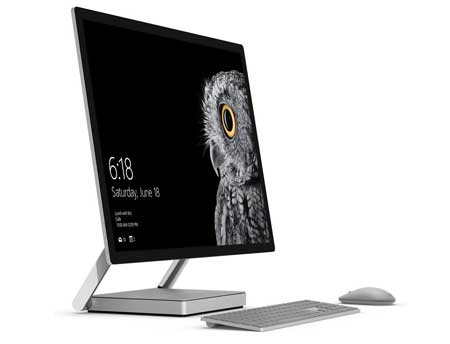 Check This on Amazon |
|
| CPU | Intel Core i5 |
| Processor Speed | 2GHz |
| GPU | NVIDIA GeForce GTX 960M |
| Graphics Card Memory | 4GB |
| RAM | 8GB |
| Storage Space | 1TB |
| Operating System | Windows 10 |
| Dimensions | 25.09 x 0.44 x 17.07 inches |
| Keyboard & Mouse | Included in Slae |
| Computer Monitor | 28-inch adjustable PixelSense Display with touchscreen |
| Advantages | Performance |
| Disadvantages | Quite Expensive |
Microsoft Surface Studio (1st Gen) (Intel Core i7, 16GB RAM, 1TB) |
|
|---|---|
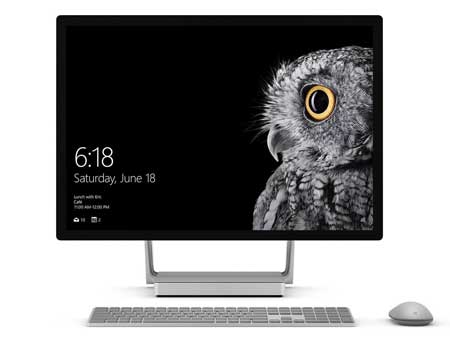 View it on Amazon |
|
| CPU | Intel Core i7 |
| Processor Speed | 2.7 GHz |
| GPU | NVIDIA® GeForce® GTX 980M |
| Graphics Card Memory | 4GB |
| RAM | 32GB |
| Storage Space | 1TB |
| Operating System | Windows 10 |
| Dimensions | 25.1 x 0.5 x 17.3 inches |
| Keyboard & Mouse | Included |
| Computer Monitor | 28-inch adjustable PixelSense Display with touchscreen, 4500 x 3000 Pixels |
| Advantages | Storage, Performance |
| Disadvantages | NA |
Microsoft Surface Studio (1st Gen) (Intel Core i7, 32GB RAM, 2TB) |
|
|---|---|
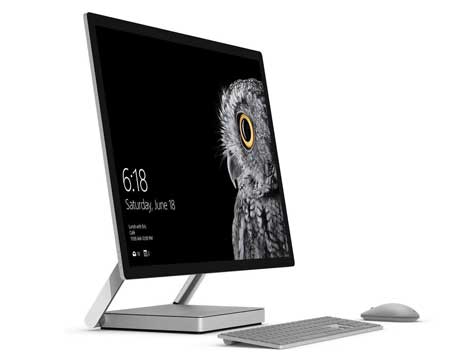 Check This out on Amazon |
|
| CPU | Intel Core i7 |
| Processor Speed | 2.7 GHz |
| GPU | NVIDIA® GeForce® GTX 980M |
| Graphics Card Memory | 4GB |
| RAM | 32GB |
| Storage Space | 2TB |
| Operating System | Windows 10 |
| Dimensions | 25.1 x 0.5 x 17.3 inches |
| Keyboard & Mouse | Included |
| Computer Monitor | 28-inch adjustable PixelSense Display with touchscreen, 4500 x 3000 Pixels |
| Advantages | Performance, Large Storage |
| Disadvantages | NA |
Microsoft Surface Studio 2 (Intel Core i7, 16GB RAM, 1TB) |
|
|---|---|
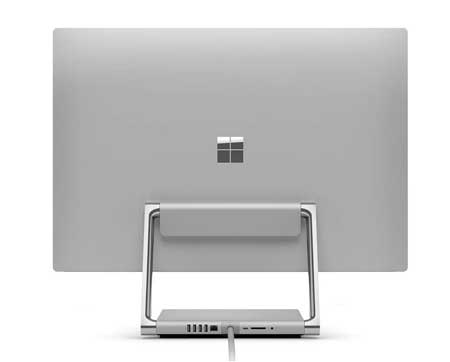 Check This on Amazon |
|
| CPU | Intel Core i7 7th Gen |
| Processor Speed | 3.2Ghz |
| GPU | NVIDIA GeForce 1060 GPU |
| Graphics Card Memory | 6GB |
| RAM | 16 GB |
| Storage Space | 1 TB Dive |
| Operating System | Windows 10 |
| Dimensions | 21.61 x 25.09 x 8.59 inches |
| Keyboard & Mouse | Included in Sale |
| Computer Monitor | 28" PixelSense Display, 4500x3000 Pixels |
| Advantages | Performance, Quality Display |
| Disadvantages | NA |
Microsoft Surface Studio 2 (Intel Core i7, 32GB RAM, 1TB) |
|
|---|---|
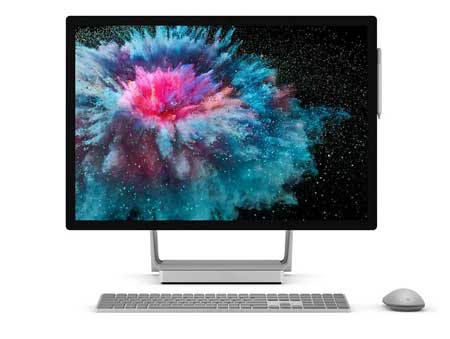 View This on Amazon |
|
| CPU | Intel Core i7 7th Gen |
| Processor Speed | 3.2Ghz |
| GPU | discrete NVIDIA GeForce 1070 GPU |
| Graphics Card Memory | 8GB |
| RAM | 32 GB |
| Storage Space | 1 TB Dive |
| Operating System | Windows 10 |
| Dimensions | 21.61 x 25.09 x 8.59 inches |
| Keyboard & Mouse | Included in Sale |
| Computer Monitor | 28" PixelSense Display, 4500x3000 Pixels |
| Advantages | Performance, Quality Display |
| Disadvantages | Quite Expensive |
Microsoft Surface Studio 2 (Intel Core i7, 32GB RAM, 2TB) |
|
|---|---|
 View This on Amazon |
|
| CPU | Intel Core i7 7th Gen |
| Processor Speed | 3.2Ghz |
| GPU | NVIDIA GeForce 1070 GPU |
| Graphics Card Memory | 8GB |
| RAM | 32 GB |
| Storage Space | 2 TB Dive |
| Operating System | Windows 10 |
| Dimensions | 21.61 x 25.09 x 8.59 inches |
| Keyboard & Mouse | Included in Sale |
| Computer Monitor | 28" PixelSense Display, 4500x3000 Pixels |
| Advantages | Performance, Quality Display |
| Disadvantages | NA |




